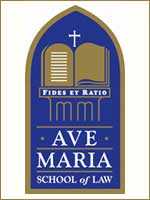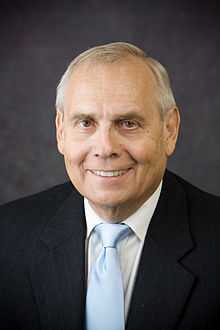Ave Maria School of Law
| Ave Maria School of Law | |
|---|---|
 | |
| Established | 1999 |
| School type | Private |
| Dean | Kevin Cieply (Dean) |
| Location | Naples, Florida, USA |
| Enrollment | 270 |
| Faculty | 59 |
| Website | www.avemarialaw.edu |
| ABA profile | Ave Maria School of Law profile |
The Ave Maria School of Law, founded in 1999, is an ABA-accredited Roman Catholic law school, located in Naples, Florida.[1] In the 2014-2015 academic year, there were over 270 students enrolled from a variety of states, countries, and undergraduate institutions.[2] Classes commenced in the fall semester of 2000.
Ave Maria School of Law offers a full-time three year Juris Doctor (J.D.) program that complements a traditional legal education based on the Socratic Method with an emphasis on how the law intersects with the Catholic intellectual tradition and natural law philosophy. The curriculum of Ave Maria School of Law includes a three-semester Research, Writing and Advocacy Program as well as several required courses that focus on law and ethics.[3] The school also offers various summer courses. [4] Ave Maria devotes four core classes to the interrelationship between law, ethics, and Catholic moral and social principles. [5]
According to Ave Maria's 2014 ABA-required disclosures, 59.1% of the Class of 2014 obtained employment in professional positions or those in which a JD is an advantage nine months after graduation.[6]
History and governance


Thomas S. Monaghan, founder of Domino's Pizza and former owner of the Detroit Tigers, supports the school through his Ave Maria Foundation and has served as the chairman of the board of governors of the school, which also includes Adam Cardinal Maida, and Frank Joseph Dewane and included before their deaths Bowie Kuhn and John Cardinal O'Connor.[7]
Ave Maria School of Law was founded in 1999, and for the first nine years of its existence was located in Ann Arbor, Michigan. The law school's beginnings lie in discussions between future Founding Dean Bernard Dobranski and Monaghan. The school currently has 30 professors and 29 adjunct faculty.[8] Supreme Court Justice Antonin Scalia assisted Ave Maria School of Law leadership in developing the school's curriculum, and in 1999 Supreme Court Justice Clarence Thomas delivered the school's first annual Ave Maria Lecture.[9] Former professors include Robert Bork.[10]
The school moved from Ann Arbor, Michigan, to Naples, Florida, opening in the new location in August 2009.
Organization and Administration
Dean Kevin Cieply, JD, LLM, became the third President and Dean of the Law School effective July 1, 2014.[11]
Campus
Ave Maria School of Law educates students at The Vineyards Campus in northeastern Naples, Florida. From 1999 to Spring 2009, the Law School was located in Ann Arbor, Michigan.[12]
The current campus consists of six major buildings located on 12 acres (49,000 m2) in the Vineyards community: the Faculty and Administration Building;[13] the Law Library;[14] the St. Thomas More Commons;[15] West and East Halls; and the Clinic/Student Organizations Building. There is an additional 16 villa-style residences available on campus for student/faculty families.[16] Located adjacent to the campus is the Vineyards Elementary School.
The St. Thomas More Commons contains a large classroom for 100+ students, the Moot Courtroom, the Law School Bookstore, the St. Thomas Aquinas Chapel, a student lounge and coffee shop, and the Office of Admissions.
The Ave Maria Law Library is located between the Faculty and Administration Building and the St. Thomas More Commons. The Law Library includes a large main reading room, multiple group-study rooms, carrel and table seating, and administrative offices for library staff. The Ave Maria School of Law Library supports the mission of the school by providing a core research collection and a research environment that includes print and electronic formats. The Acting Director and Head of Public Services is Mr. Ulysses N. Jaen, J.D., M.P.A., M.I.L.S. The collection is especially strong in Legal History, Legal Ethics, Bioethics, the Catholic Intellectual Tradition, Ancient and Medieval Philosophy, Legal Ethics and Canon Law. The Library’s materials can be located and accessed via the law library online catalog.
Publications
The Ave Maria Law Review[19] and the International Law Journal[20] are prepared and published by the students of the Juris Doctor program. The Law School External Affairs Office also publishes the Ave Maria School of Law Advocate, a yearly publication reflecting the status of the school and current events.
Rankings
U.S. News & World Report ranks Ave Maria in the fourth tier.[21]
In 2003, the graduating class passed the Michigan bar examination at a rate of 93% among first-time takers, which was the top rate in Michigan. In 2004, the school had 100% Michigan bar passage rate, and in 2006, the passing rate was 96%, which is the highest overall among Michigan law schools. Its Moot court team earned top honors in four of the last six years the school was in Michigan.[22] Graduates have secured 54 judicial clerkships – 44 of these with federal courts.[23]
As reported in The Chronicle of Higher Education, Ave Maria School of Law was one of 114 private colleges nationwide to fail a federal financial responsibility test in 2007, 2008, and 2009.[24][25] In a statement about the Chronicle report, the ten-year-old law school said its low asset-to-debt ratio was “typical of recently founded institutions” and “represents no change in our fiscal health and should not be cause for concern.” Tom Monaghan also has committed to cover the school’s operating deficits until 2017.[26] In 2010, Ave Maria's Dean Milhizer said, "The Law School's finances are very strong and our fundraising results were up in the fiscal year that closed June 30 compared to the past few years. We project this trend will continue and grow stronger in the years to come as our student population increases in size and fundraising results continue to improve." Since the move of the law school in 2009, both enrollment and selectivity of students has increased dramatically from the drop it initially suffered when the move occurred. In 2010, the school's director of external affairs, John Knowles, said the quality of the incoming classes was improving and in 2010 the school's selectivity rate improved to 46 percent - the best in the school's history.[27] Ave Maria School of Law is not affiliated with Ave Maria University, which has not been cited in any federal financial test.
Post-graduation employment
According to Ave Maria's 2014 ABA-required disclosures, 37.3% of the Class of 2014 obtained full-time, long-term, JD-required employment nine months after graduation, with 31.8% still seeking employment at that time.[28]
Bar passage rate
In 2011, the last graduating year with students that entered in Ann Arbor, Ave Maria officials claim that the move from Michigan to Florida "could still be felt". For Florida bar exams taken in July 2011, 11 of the 23 of Ave Maria Law School graduates taking the exam passed, placing it last among Florida's eleven law schools. The school added a mandatory class on the bar exam about a year before the 2011 testing.[29][30] In the February 2015 Florida bar exam, Ave Maria School of Law was ranked first among Florida law schools based on bar passage rates, with 83.3% of their students passing the bar exam, though that represents 10 of 12 students who took the test. [31]
Incoming Class Profile
The Class of 2016, entering the law school in 2013, included 119 students from 89 different undergraduate institutions and 29 states. Forty-six percent of the class were ethnic minorities. Fifty-nine percent were Catholic, and 31% of other Christian faiths. The class was 51% female. The median LSAT score for the class was 146 and the median GPA was 3.15.[32]
Costs
The total cost of attendance (indicating the cost of tuition, fees, and living expenses) at Ave Maria for the 2015-2016 academic year is $63,506.[33] The Law School Transparency estimated debt-financed cost of attendance for three years is $231,707.[34] Prospective students with an LSAT Score of 154 or above and a minimum undergraduate GPA of 3.20 may qualify for a full tuition scholarship. [35]
References
- ↑ American Bar Association Grants Full Accreditation to Ave Maria School of Law
- ↑ Ave Maria School of Law: In Brief
- ↑ Curriculum
- ↑
- ↑
- ↑
- ↑ Board of Governors List
- ↑
- ↑ Lectures
- ↑ Faculty Profiles
- ↑ http://www.avemarialaw.edu/faculty/presidentanddean
- ↑ Location
- ↑ Faculty and Administration Building
- ↑ The Law Library
- ↑ St. Thomas More Commons
- ↑ Housing
- ↑
- ↑
- ↑ Law Review
- ↑ International Law Journal
- ↑ US News and World Report Rankings
- ↑ Moot Court
- ↑ Alumni Placement
- ↑ Karen Sloan (August 13, 2010). "Government says law school's financing lags". The National Law Journal. Retrieved 2010-08-14.
- ↑ Goldie Blumenstyk and Alex Richards (August 11, 2010). "149 Nonprofit Colleges Fail Education Department's Test of Financial Strength". The Chronicle of Higher Education. Retrieved 2010-08-14.
- ↑ http://m.naplesnews.com/news/2009/jun/10/report-ave-maria-law-school-fails-federal-financia/
- ↑ http://aveherald.com/news/685-ave-maria-law-schools-bar-passage-rate-lags-most-florida-schools.html
- ↑
- ↑ http://74.6.117.48/search/srpcache?ei=UTF-8&p=ave+maria+2011+law+school+bar+pass+rate&type=pogostd&fr=oberhp&u=http://cc.bingj.com/cache.aspx?q=ave+maria+2011+law+school+bar+pass+rate&d=4724425700803681&mkt=en-US&setlang=en-US&w=bd9b54db,61675a51&icp=1&.intl=us&sig=TgRYmuocq5SnNqWoRxYjQA--
- ↑ http://www.naplesnews.com/news/2011/sep/21/ave-maria-law-ranks-last-state-bar/
- ↑
- ↑
- ↑
- ↑ "Ave Maria School of Law Profile".
- ↑
- "Premier National Catholic Law School to be Established in the Ann Arbor Area," Ave Maria School of Law media release, April 7, 1999
- "Ave Maria founder Tom Monaghan is a man of faith, plans and action," Marci Elliott, Naples Daily News, April 13, 2003. Archived at Catholic Education Resource Center, accessed October 9, 2006